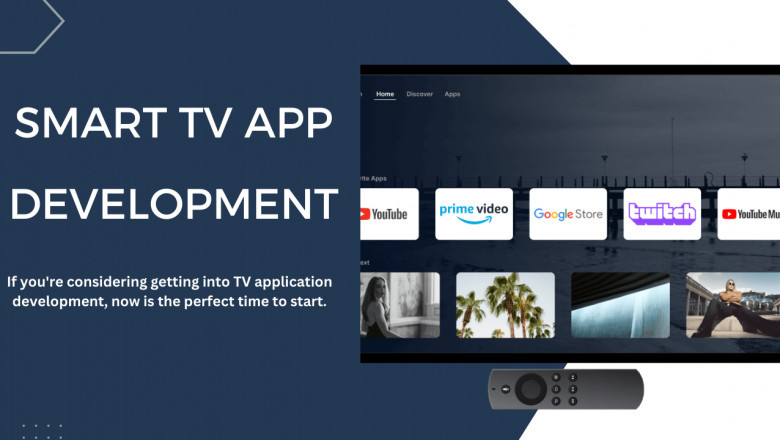views
Smart signage is one of the best tools for modern businesses to show content, advertisements, or information on digital screens in stores, airports, hospitals, and more. To build great apps for these screens, you must understand software and hardware. In this article, we will guide you step by step on how to create reliable, fast, and flexible apps for smart signage systems.
What Are Smart Signage Devices?
Smart signage devices are digital displays used to show dynamic content. These devices are powered by built-in systems like Android or Linux. They work with the internet and are often managed remotely.
Main Parts of a Smart Signage Device:
-
Screen (LCD, LED, or OLED)
-
Operating system (Android or Linux)
-
Network (Wi-Fi or Ethernet)
-
Media player (for videos and images)
-
Cloud system for remote control
Using Smart TV App Development for Signage
Many signage devices are similar to Smart TVs. This means you can use the same tools and skills used in Smart TV App Development to create apps for digital signage.
Smart TV App Development Services help you design and build apps that work perfectly on large screens. These services focus on creating simple, easy-to-use interfaces that display videos, images, or web content without errors.
If you’re not a developer, hiring a trusted Smart TV App Development Company can save time and ensure high-quality results. These companies understand both the software and hardware used in signage systems.
Best Platforms to Build Smart Signage Apps
1. Android Platform
Many signage devices run on Android. It is flexible and supports custom apps.
-
Use Android Studio to build the app
-
Set the app to always stay on top (Kiosk Mode)
-
Support video, image, and text content
-
Allow remote updates and control
2. Web-Based (HTML5)
If your signage device has a browser, you can use web apps.
-
Built with HTML, CSS, JavaScript
-
Use a responsive design for different screen sizes
-
Store content locally in case the internet goes down
-
Use APIs to get content updates in real time
3. Linux-Based Devices
These are more common in industrial settings.
-
Write the app in Python, C++, or Qt
-
Use lightweight systems to save memory
-
Create your own control system for remote management
Design Tips for Smart Signage Apps
-
Use big, bold text that’s easy to read from far away
-
Keep screens simple—less is more
-
Choose high-contrast colors so content is visible in any lighting
-
Use animations only when needed, and keep them smooth
-
Test the layout on different screen sizes (HD, Full HD, 4K)
Managing Content Remotely
Your signage app should allow content to be updated without touching the device.
You Need to Include:
-
A web dashboard to upload new content
-
Schedule tools to decide when each content should play
-
API integration so devices can download new files
-
Local storage on the device so content still plays offline
Controlling the Devices from Anywhere
Smart signage apps must include tools to check if screens are working.
Features to Add:
-
Heartbeat check to know the device is online
-
Send updates over the air (OTA)
-
Restart or control devices remotely
-
See what’s playing on each screen
Use tools like Firebase, AWS, or custom cloud servers to manage these tasks.
Security Tips for Your Signage App
-
Use HTTPS for secure communication
-
Lock the app so users can't close it (Kiosk Mode)
-
Set up password-protected access to the backend
-
Keep your devices updated with the latest software
-
Block ports and features not needed
Make the App Run Smoothly
Smart signage devices don’t have as much power as smartphones or PCs. Keep apps light and fast.
-
Compress images and videos
-
Don't run extra background services
-
Test the app on real devices, not just emulators
-
Clean up memory and unused resources
Easy Deployment and Maintenance
When you have many devices, they must be easy to set up and maintain.
-
Add a setup wizard when the app first runs
-
Use QR codes or device IDs for fast registration
-
Allow bulk updates and configuration
-
Plan regular system checks and updates
Testing the App Before Release
-
Test how your app handles poor internet
-
Make sure it plays videos and images without freezing
-
Check display quality on all screen sizes
-
Fix bugs and crashes before sending to real devices
The Role of Smart TV App Development Companies
If you want to save time, work with a good Smart TV App Development Company. They have experience building apps that look great and perform well on large screens.
A company offering Smart TV App Development Services will:
-
Help you design the interface
-
Build strong backend systems
-
Test the app on various devices
-
Support you after launch
This is helpful for companies without in-house developers.
Conclusion
Smart signage is the future of business communication. Whether you're building your system or hiring a Smart TV App Development Company, the goal is the same to create apps that are stable, easy to use, and visually attractive. Smart signage apps can be powerful tools for marketing, information, and customer engagement.






















Comments
0 comment